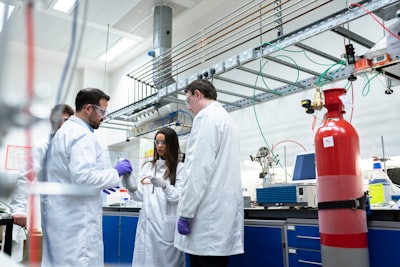Benefits Of A Cosmetic Manufacturing Laboratory

A cosmetic manufacturing laboratory is typically an administrative or clerical service facility which produces high quality cosmetic products, usually under the direct supervision of cosmetic plastic surgeons. Most cosmetic manufactures choose to establish a cosmetic manufacturing laboratory on their premises, however, most cosmetic manufactures do not have such an option. The BPI Labs are generally found in large hospitals or training facilities. They serve as the command center for cosmetic product development and are staffed by cosmetic surgeon specialists. Cosmetic manufacture personnel perform clinical tests and cosmetic manufacture samples in the laboratory.
The cosmetic manufacturing laboratory process raw materials, such as oils, waxes, creams, and other substances used in the production of cosmetic products. These raw materials are then mixed with a variety of chemicals, hydrates, additives, coloring agents, preservatives, and other additives in varying proportions and strengths to form molds and polymerized forms. These molds and polymerized forms are then tested on a large range of soft and hard surface to determine compatibility and effectiveness. Cosmetic manufacturers then manufacture cosmetic products from these forms. Cosmetic manufacturing laboratories also manufacture plastic firming cosmetics, collagen, and elastin cosmetic products, and other skin care and pharmaceutical products such as skin creams and lotions. In addition, cosmetic manufacturing laboratories manufacture medical and pharmaceutical products such as suntan lotions, lip balms, and antiseptic creams and gels.
A cosmetic manufacturing laboratory must demonstrate scientific knowledge in the following areas: quality control testing of the raw materials and/or the completed goods produced, method development and validation of processes and procedures, methods for product safety analysis, and workers compensation and health hazards evaluation. The laboratory should also be equipped with the necessary tools and machinery to conduct the various test procedures required. The laboratory should have well-trained staff that possesses the needed skills and knowledge to safely handle all types of materials and completed goods.
Several international conventions and agreements regarding the protection of the environment and the use of ingredients, additives, and process aids have been implemented by cosmetic manufacturing laboratories. These conventions aim to maintain the quality of the human health, the ecological condition, and the natural resources that are part of the supply chain for cosmetic products. Many of these conventions were created by cosmetic manufacturers themselves to comply with local, regional, and national regulatory bodies. Many cosmetic manufacturing laboratories also have implemented standards of training and certification for their employees in these areas.
On the other hand, an off-site assembly line labor force might be cheaper than having the cosmetic manufacturer do the design, development, and manufacturing. The cosmetic manufacturer might have access to trained lab assistants and skilled engineers who are cost-effective than the off-site labor. But, the manufacturer can never guarantee that quality control or safety data will be available during the course of production. Safety is always a concern during any type of manufacturing operation. Off-site lab workers also may be subject to hazards such as radiation, toxins, and chemicals. Neither can the cosmetic manufacturer be sure that the products will be made properly and won't contain any errors. See page for more details on cosmetic manufacturing laboratory.
There are cosmetic manufacturing laboratory designs and technologies that combine the best elements of on-site, off-site, and integrated services. The laboratory combines several services such as the preparation of samples, the production and packaging of finished goods, and the analysis and testing of those products. By combining all these different services, a laboratory becomes more efficient and reduces costs significantly. It also increases productivity, improves quality, and increases profitability. The added services are more cost-effective, efficient, and allow cosmetic manufacturers to serve multiple markets with a single product.If you probably want to get more enlightened on this topic, then click on this related post: https://en.wikipedia.org/wiki/Label .